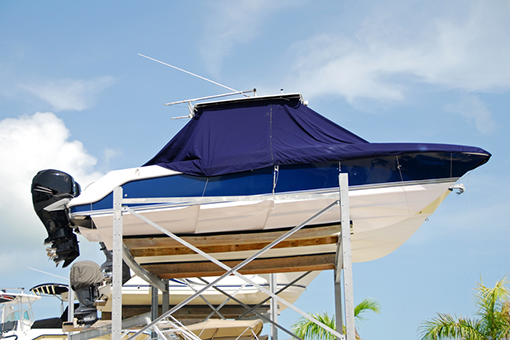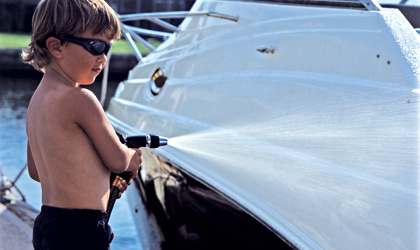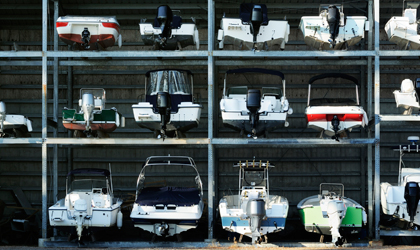Imagine that you’ve just purchased a shiny new vessel and docked it at your local marina. As the years go by, it will undergo various temperature and humidity changes. And unfortunately, this wet-dry cycle of expanding and contracting will surely take a toll on your boat’s Gelcoat and wood brightwork.
Now, combine that with the reality of salty air, pollution, dust, and rodents. The result? Well, your beloved vessel will have taken quite a beating.
Unless, of course, you protect it with a boat cover. This simple investment can prevent many problems from wreaking havoc on your boat (faded and oxidized Gelcoat, bleached and cracked wood, mildew and mold – the list goes on).
If you aren’t sure which type of boat cover to purchase, don’t worry. In this blog post, we’ll help you make the best selection for your vessel, so you can protect it for many years to come.
Do I Need a Boat Cover?
What is a boat cover other than a shield from nature’s harshest elements? Protecting your boat from UV rays, debris, and inclement weather is key to prolonging its lifespan and maintaining its value.
In addition, boat covers will protect any possessions you keep within your boat from being stolen or destroyed.
The Ultimate Boat Cover Buying Guide
Do you need help navigating the various boat cover options? Our boat cover buying guide explains everything you need to know before making a purchase:
Storage Covers vs. Trailering Cover
Storage bag covers are designed to fit loosely around your rig. That’s because they protect boats when anchored (either at a dock or stored on a trailer).
On the other hand, trailer covers have a snug fit that is designed for traveling. They are reinforced in high-wear areas to withstand traveling at high speeds (like on a highway).
Fabric Selection
Boat cover fabrics need to be both breathable and water-repellent. In addition, they should be UV- and mildew-resistant. As you can probably guess, few materials make the cut.
We recommend sticking with coated synthetic fabrics. Specifically, pigment-dyed polyester has an excellent strength-to-weight ratio, breathability, water resistance, and UV-ray resistance.
Hot Shot™ is a great (and affordable) option if you need a recommendation. It is an acrylic-coated polyester that is breathable, stain-, mildew, and UV-resistant. Urethane-coated, solution-dyed polyester fabrics and solution-dyed acrylics are also great.
Custom Boat Covers
Another boat cover option is to go the custom route. Semi-custom covers are designed to fit several makes/models of boats with the same hull style. Alternatively, custom covers are made for your boat’s precise make, model, and year.
As you can probably imagine, custom covers are significantly more expensive. However, you get what you pay for; they are easy to put on/remove, trailer with and will last the longest.
Frequently Asked Questions
Below are the answers to some of the most frequently asked questions about selecting the right boat cover:
How Much Do Boat Covers Cost?
As we mentioned, custom boat covers are the most expensive, costing anywhere from $700 to $1,200. If you’re looking for a more affordable option, generic box covers are $50 to $150. However, be wary that the latter won’t fit very well, and they will have a shorter lifespan.
How Long Do Boat Covers Last?
Over time, boat covers become susceptible to normal wear and tear. As a result, they last about 7-12 years on average. Note that more expensive covers often last longer than average, and cheaper covers last shorter.
Is It Okay to Leave Your Boat Uncovered?
In short, the answer is no. Leaving your boat uncovered will damage its interior and expose it to the sun’s harmful rays. When boats are left uncovered, they tend to lose value incredibly quickly.
How to Clean a Boat Cover?
You should wash your boat cover with mild soap and detergent. Begin by shaking off the dust, rinsing the dirt with a hose, and using compressed air for stubborn clumps of debris.
Be careful not to use a scrub brush or bleach, as these will damage the cover. Additionally, avoid throwing it in the washer or dryer. Once you’re finished cleaning your boat cover, hang it on a line to dry.
How to Prevent Water from Pooling on Boat Cover?
Many boat owners struggle with water pooling on top of their boat covers. We recommend investing in a proper boat cover support system or frame to prevent this. These will also help keep the covers tight. If interested, you can have a support system professionally installed or purchase a DIY kit.
Conclusion: Purchase a Boat Cover to Ensure Your Boat’s Future!
Boat covers are an investment every boater should make. You’ll reduce the likelihood of damage by purchasing a high-quality, durable boat cover. After reading this post, we hope you’re ready to select the right boat cover for your vessel!


